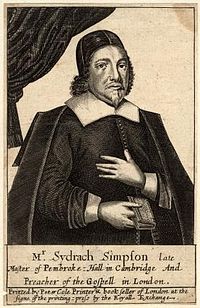
Sidrach Simpson (c.1600-1655) was an English Independent minister, one of the leaders of the Independent faction in the Westminster Assembly.

Sidrach Simpson (c.1600-1655) was an English Independent minister, one of the leaders of the Independent faction in the Westminster Assembly.
Sidrach Simpson came from Lincolnshire. He was educated as a sizar at Emmanuel College and Queens' College, Cambridge. [1]
After losing his Church of England status under William Laud, he spent time as a minister in the Netherlands. In the Westminster Assembly he was one of the "Five Dissenting Brethren" putting their names to the An Apologeticall Narration presented to Parliament on 3 January 1644. The others in the group were William Bridge, Jeremiah Burroughs, Thomas Goodwin and Philip Nye, all with a comparable Dutch background as ministers (Burroughs and Simpson both in Rotterdam [2] ), and united in a form of Congregationalism [3] [4] He was also in the group of ten, dominated by Independents, condemning in 1652 the Racovian Catechism, with Nye and Bridge, six further Independents, [5] John Dury, and Adoniram Byfield. [6]
He became Master of Pembroke Hall, Cambridge in 1650, but was drifting in his last years to the outer extremes in his positions.[ citation needed ] He was preoccupied with his concurrent post as rector in London, at St Mary Abchurch, and then from 1653 at St Bartholomew-by-the-Exchange. [7] [8] Oliver Cromwell had him imprisoned for aggressive preaching. [8]

John Bacon was a British sculptor who worked in the late 18th century. Bacon has been reckoned the founder of the British School of sculpture. He won numerous awards, held the esteem of George III, and examples of his works adorn St Paul's Cathedral and Westminster Abbey in London, Christ Church, Oxford, Pembroke College, Oxford, Bath Abbey and Bristol Cathedral.

Pembroke College, a constituent college of the University of Oxford, is located at Pembroke Square, Oxford. The college was founded in 1624 by King James I of England, using in part the endowment of merchant Thomas Tesdale, and was named after William Herbert, 3rd Earl of Pembroke, Lord Chamberlain and then-Chancellor of the University.

Edmund Calamy was an English Presbyterian church leader and divine. Known as "the elder", he was the first of four generations of nonconformist ministers bearing the same name.
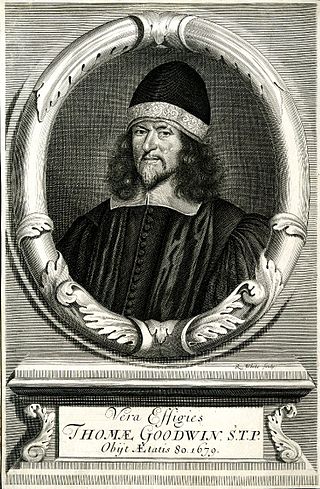
Thomas Goodwin, known as "the Elder", was an English Puritan theologian and preacher, and an important leader of religious Independents. He served as chaplain to Oliver Cromwell, and was appointed by Parliament as President of Magdalen College, Oxford, in 1650. Christopher Hill places Goodwin in the "main stream of Puritan thought".
Thomas Edwards (1599–1647) was an English Puritan clergyman. He was a very influential preacher in London of the 1640s, and was a polemical writer, arguing from a conservative Presbyterian point of view against the Independents.
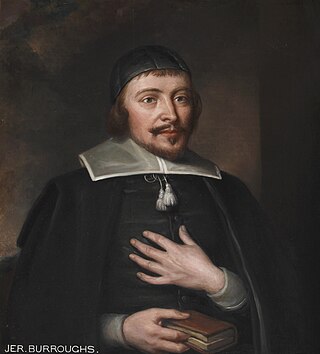
Jeremiah Burroughs was an English Congregationalist and a well-known Puritan preacher.
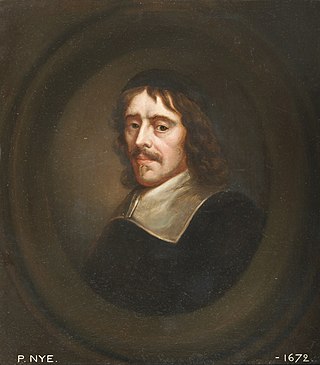
Philip Nye was a leading English Independent theologian and a member of the Westminster Assembly of Divines. He was the key adviser to Oliver Cromwell on matters of religion and regulation of the Church.
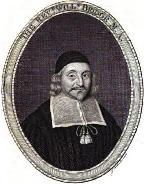
William Bridge was a leading English Independent minister, preacher, and religious and political writer.
Richard Vines was an English clergyman, one of the Presbyterian leaders of the Westminster Assembly. He became Master of Pembroke Hall, Cambridge, from 1644 to 1650.
Thomas Young was a Scottish Presbyterian minister and theologian, resident in England and a member of the Westminster Assembly. He was the major author of the Smectymnuus group of leading Puritan churchmen. He was also Master of Jesus College, Cambridge, and is known as the tutor to John Milton from the age of about ten.
William Spurstowe (Spurstow) was an English clergyman, theologian, and member of the Westminster Assembly. He was one of the Smectymnuus group of Presbyterian clergy, supplying the final WS of the acronym.

William Gouge (1575–1653) was an English Puritan clergyman and author. He was a minister and preacher at St Ann Blackfriars for 45 years, from 1608, and a member of the Westminster Assembly from 1643.
Adam Steuart (1591–1654) was a Scottish philosopher and controversialist.
Jeremiah Whitaker (1599–1654) was an English Puritan clergyman, and important member of the Westminster Assembly.
Lazarus Seaman, was an English clergyman, supporter in the Westminster Assembly of the Presbyterian party, intruded Master of Peterhouse, Cambridge, and nonconformist minister.
William Moses (1623?–1688) was an English academic and lawyer, Master of Pembroke College, Cambridge, during the Interregnum and later serjeant-at-law.
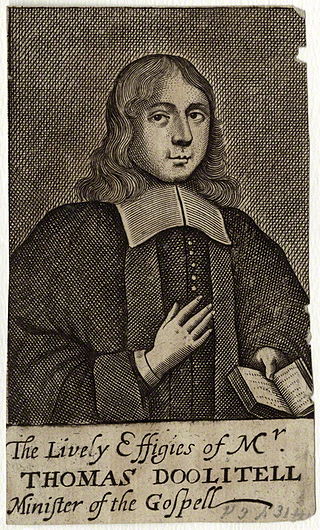
Thomas Doolittle (1632?–1707) was an English nonconformist minister, tutor and author.
An Apologeticall Narration, Hvmbly svbmitted to the Honourable Houses of Parliament. By Tho: Goodwin, Philip Nye, Sidrach Simpson, Jer: Burroughes, William Bridge. London, Printed for Robert Dawlman, M.DC.XLIII. [1643] was a theological tract submitted by five Independent preachers to the English Parliament on 3 January 1644 as a part of the debates taking place during the Westminster Assembly.